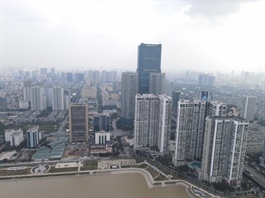Big appetite still apparent in real estate
Big appetite still apparent in real estate
The Vietnamese real estate market is proving attractive to foreign investors and funds despite the turmoil that domestic real estate investors are grappling with over projects lacking legitimacy, capital, and liquidity.

According to the 2023 Asia-Pacific Investor Intentions Survey released by CBRE Research in January, for the first time, Ho Chi Minh City and Hanoi made it to the top 10 for cross-border investment. Placing third overall, Ho Chi Minh City is even more attractive than Australia.
Foreign investors interested in the residential property market in Vietnam are mostly from Asian markets such as Hong Kong, Singapore, China, South Korea, and Japan.
With an urbanisation rate of 42 per cent, in the eyes of investors, Vietnam still has a long way to go and has a growing middle-class population, which makes it an attractive destination for capital.
Singaporean investors have started the year with a wave of activity, including several large-scale deals.
Keppel Land, a developer with a portfolio of more than 20 projects and total registered capital of $3.5 billion worldwide, signed an MoU with Khang Dien Group on February 10 to collaborate on the development of residential projects as well as sustainable urban developments in Ho Chi Minh City.
Keppel Land CEO Louis Lim confirmed the company was committed to expanding its presence in Vietnam, a key market where it sees long-term growth potential.
Sembcorp Development of Singapore earlier in February also signed an MoU with Becamex IDC on cooperation to develop five green, smart, and sustainable industrial parks in Vietnam within the next three years, at a total investment of roughly $1 billion. The parks aim to meet green, smart, and sustainable standards, using Industry 4.0 tech for infrastructure development and management.
In the report “Vietnam Real Estate: Perspectives from China and Southeast Asian Countries” by PropertyGuru Group, Vietnam’s open economic policy and integration into global supply chains have made growth possible. Therefore, a resilient supply chain is key to Vietnam’s economic strength and increasing the attractiveness of real estate to foreign investors.
If Vietnam’s transport infrastructure of seaports, highways, high-speed railways and airports is expanded and completed, real estate in Vietnam will be a more attractive destination for foreign capital, the report said.























